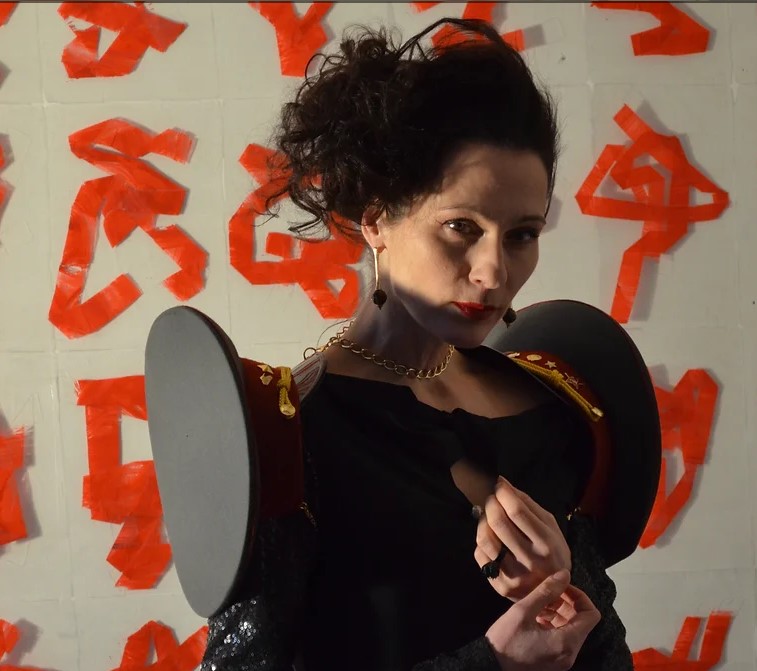
Dystopianern
Ira Błażejewska
irablazejewska.com
Born in Munich, musician and artist with German-Ingush roots, works in the field of song writing, singing/performance, painting and stages total art spaces.
During her studies she performed with chanson programs, was a member of the klezmer band “Die Shtetlmusikanten” and mother of two children. Musical engagements soon followed (Bordeaux Opera, “Cartoucherie” (Arianne Minouchkine), Paris, Isny Opera Festival) and a permanent engagement with “Ludwig Musical” (“Cosima Wagner”). Later she she started focussing on her own artistic projects such as concerts with various jazz and classical formations, projects with a cross-disciplinary approach, combining singing with literature and performance, painting and song writing. Since 2003 she has been working and actively exhibiting as a visual artist. 2011-2012 Kunstsalon in Munich, combining all experiences in a holistic art process. From 2013 to 2015 under the brand “Blood, Shit & Champagne” cultural events (riot caravan, Pandemonium, etc.). Since 2016 representation by the gallery Christoph Dürr in Munich. From 2017 intensified compositional work, realization of own texts. 2021 Scholarship holder of the German Music Fund. Received a 2022 GEMA scholarship shortly before the release of the music album DYSTOPIANERN.
Why dystopianize?
To answer the question with a counter-question: What else can we do these days? How can we maintain some kind of composure? How can we, at least occasionally, feel comfortable amidst the doom? Even have some diabolical fun now and then?
In the 1880s, the first cabaret artistique opened its doors in Paris with Le Chat Noir. It was at once political and exhilarating. People thrilled to decadent poetry and drank absinthe. It was a fulcrum for chanson singers, artists, writers and actors… it became the epitome of Parisian bohemia. At the beginning of the 20th century, the first cabaret stages appeared in Germany and Austria. In the German Empire, political criticism was strictly prohibited. Censorship was only lifted at the end of the First World War.
From then on, German cabaret flourished and offered artists such as Claire Waldoff and Karl Valentin a platform. Kurt Tucholsky and Erich Kästner wrote for the cabaret. In Munich, Die Schafricher (“The Executioners”) ran riot and the only woman in the group, the legendary Marya Delvard, showed the people of Munich what chanson was all about. In the imperial capital, Anita Berber performed virtually naked in the “Weiße Maus” and called her show “Morphium”. Allegedly, she ate rose petals dipped in ether and chloroform for breakfast. Such were the heady beginnings of cabaret, and, as yet, have never been topped.
Ira B became fascinated by the dissolution of boundaries, intoxication and intermediate worlds at a very young age. She later learned that there are real places that are home to these states. That there were eras in which decadence danced on the heads of philistines. And since then she has been a living exponent of this spirit, defying the neoliberal disfiguration of everything. Even as a little girl, she sang the chansons she found in her parents’ record collection. Albums with covers depicting mysterious and haunted-looking people. Later, she accompanied herself on the guitar and expanded her repertoire. The form possessed her. She turned everything she sang into a chanson. Along the way, she also discovered Klezmer. Klezmer songs, with their inimitable poetry, melancholy and wit, spoke to her soul… a perfect complement to the chanson. Her love of the chanson survived a singing degree, excursions into jazz and ensemble engagements in musicals, engagements as opera singer (she had her first real role in a play titled, “Cabaret Schoenberg at the Bordeaux Opera”).
The chanson is, in fact, in Ira B’s DNA. On her grandmother’s side, she hails from a Belgian-German clan of bards and minstrels: the Amsvaar. She now writes chansons herself. Contemporary chansons. Not in the mode of some cosy atavism or homely retro-nostalgia… she writes chansons for our time, drawing the bow and reinterpreting the connection between tradition and modernity in the “electro-acoustic chanson cabaret of the 2020s.”
Die Braune Raupe Nimmersatt (a play on the title of Eric Carle’s story of the insatiable caterpillar) is the first release from the upcoming album Dystopianern (Dystopianize/Dystopians). The song, an uptempo electro swing number, featuring a thirties brass trio, is a political statement, a call to artistic arms against the burgeoning threat of the populist right in Germany – as well as in too many other contemporary polities.
Dystopianern is more than just an album: it is an attitude, a state of mind, a decision.




